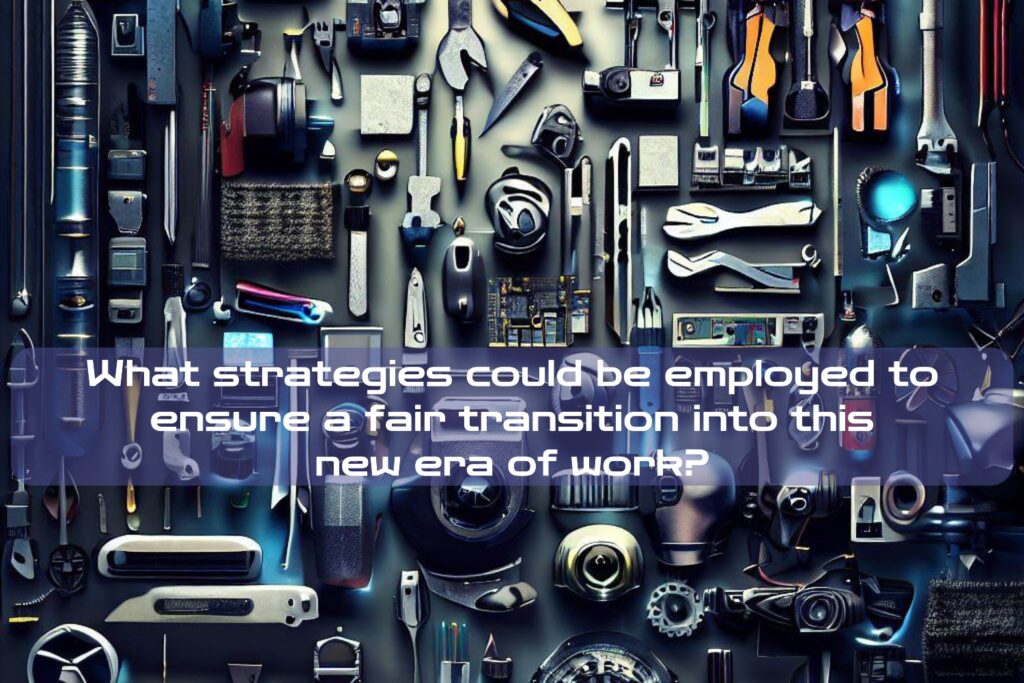The Need for a Fair Transition into a New Era of Work
The world is changing at an unprecedented pace, with technological advancements and global shifts in the economy transforming the way we work. The traditional 9-to-5 office job is no longer the norm, and many workers are now expected to be available around the clock thanks to mobile technology.
In addition, automation and artificial intelligence are making some jobs redundant while creating new ones in previously unexplored fields. While these changes offer exciting opportunities for innovation and growth, they also pose significant challenges for both employers and employees.
Many workers face uncertainty about their future careers as industries undergo disruption and transformation. Furthermore, there is growing concern that these changes will exacerbate existing inequality, with some groups having greater access to high-paying jobs than others.
Why We Need a Fair Transition

It’s clear that we need to ensure a fair transition into this new era of work in order to avoid exacerbating inequality and leaving vulnerable workers behind. A fair transition means ensuring that all workers have access to decent work opportunities, regardless of their background or circumstances.
A fair transition would also help to promote social cohesion by ensuring that everyone benefits from economic growth rather than just a select few. Moreover, it would ensure that countries remain competitive by developing skills for emerging industries.
In short, transitioning into this new era of work must be done in a way that is equitable and inclusive if we are to build stronger economies and societies. In the following sections, we will explore strategies that employers, employees, and the government can use to achieve this goal.
Strategies for Employers

Providing training and upskilling opportunities for employees
One of the best ways employers can ensure a fair transition into this new era of work is by providing ample training and upskilling opportunities for their employees. With technological advancements moving at lightning speed, it’s important to make sure your workforce is equipped with the skills they need to succeed.
This can mean offering in-house training programs or partnering with external organizations to provide specialized workshops or certifications. Providing consistent learning opportunities not only benefits your employees’ professional development, but it also sends a signal that you’re invested in their growth and success within your company.
Offering flexible work arrangements to accommodate different needs
Gone are the days of 9-to-5 office jobs being the norm. Nowadays, people have different needs when it comes to work-life balance. Offering flexible work arrangements such as remote work options or adjusted scheduling can go a long way in creating a fair transition into this new era of work.
Not only does this allow employees to better manage their personal lives, but studies have shown that it actually leads to increased productivity and job satisfaction. So why not give it a try?
Ensuring fair compensation and benefits packages
It’s no secret that compensation plays a major role in job satisfaction. And with the cost of living on the rise, ensuring fair compensation has become more important than ever before. In addition to competitive salaries, employers should also consider offering benefits such as healthcare coverage, retirement plans, and paid time off.
By providing comprehensive benefits packages, employers are able to attract top talent while also retaining current employees who feel appreciated and valued by their employer. This is an essential part of creating a fair transition into this new era of work.
Creating a supportive company culture that values diversity and inclusion
Creating a supportive company culture that values diversity and inclusion can make all the difference when it comes to a fair transition into this new era of work. This means actively promoting a workplace where everyone is treated with respect and given equal opportunities for growth.
This can involve implementing policies that prevent discrimination or harassment, celebrating different cultural identities, or fostering an environment of open communication. By prioritizing diversity and inclusion in your company culture, you’ll not only create a fairer workplace but also reap the benefits of having a more engaged and productive workforce.
Strategies for Employees

Taking advantage of training and upskilling opportunities
As technology continues to rapidly advance, it is important for workers to keep their skills relevant and up-to-date. One way to do this is by taking advantage of training and upskilling opportunities offered by employers or through external programs. These can include online courses, workshops, or even formal education programs.
By actively seeking out these opportunities, employees can increase their value in the job market and be better prepared for changes in their industry. It may also be helpful for employees to identify areas where they may need additional training or education.
This could involve researching new technologies or industry trends and identifying ways to develop skills in those areas. Employers are often willing to invest in the development of their workforce, so it is important for employees to be proactive in seeking out these opportunities.
Building a strong professional network to stay informed about job opportunities
Another way for employees to ensure a fair transition into a new era of work is by building a strong professional network. This can involve attending industry events, joining professional organizations, or even using social media platforms like LinkedIn to connect with others in their field.
By building relationships with others in their industry, employees can gain valuable insights into emerging trends and potential job opportunities. They may also be able to find mentors who can offer guidance on career development.
Negotiating for fair compensation and benefits packages
Employees should never feel afraid to negotiate for fair compensation and benefits packages when starting a new job or during contract renewals. It is important that they do research on industry standards so that they are aware of what constitutes as fair pay rates before negotiating.
Some factors that should be taken into consideration include education level, experience in the field, geographic location of the job position (cost-of-living), etc.. Additionally, employee benefits such as medical insurance, retirement packages, and paid vacation should be weighed in the equation. Advocating for workplace policies that support diversity, equity, and inclusion
Employees can play an important role in advocating for workplace policies that support diversity, equity, and inclusion. This may involve speaking out against discriminatory practices or supporting initiatives to increase the representation of marginalized groups within the workforce.
By working together with their employers and colleagues to create a more inclusive work environment, employees can help ensure that everyone has an equal opportunity to succeed. This not only benefits individuals but also contributes to the overall success of businesses and industries.
Strategies for Government

Implementing policies that promote worker protection and job security
The government plays a crucial role in ensuring fair labor practices and protecting workers’ rights. To ensure a smooth transition into the new era of work, policymakers must implement policies that offer job security and protect workers from exploitation. This can be done by strengthening labor laws, enforcing minimum wage laws, and protecting workers from discrimination in the workplace.
Additionally, creating safety standards that protect employees’ physical and mental health is essential. These policies could include providing paid sick leave, parental leave, or mental health days to support workers in taking care of their physical or emotional wellbeing.
Investing in education and training programs to prepare workers for new industries
With emerging technologies reshaping industries by the day, it is crucial that governments invest in education and training programs to prepare workers for these new industries. By providing access to upskilling opportunities, governments can help employees adapt to the changing job market. These training programs might include coding boot camps or workshops on artificial intelligence.
Governments could also partner with educational institutions to provide scholarships or grants for those who want to learn new skills but cannot afford the cost of higher education. By investing in these programs, governments can create a more skilled workforce capable of competing in this new era of work while promoting economic growth.
Encouraging businesses to adopt fair labor practices through incentives or penalties
Governments should encourage businesses to adopt fair labor practices through incentives or penalties. For instance, policymakers could offer tax credits or other financial incentives for companies that provide employee benefits like paid time off or parental leave.
On the other hand, businesses that do not treat their employees fairly should face penalties such as fines or legal consequences. By doing so, policymakers can create a level playing field where all businesses are encouraged to treat their employees well while simultaneously promoting economic growth.
The government must take an active role in ensuring a fair transition into this new era of work. By implementing policies that promote worker protection and job security, investing in education and training programs, and encouraging businesses to adopt fair labor practices, policymakers can create a more just and equitable labor force while promoting economic growth.
Final Thoughts: A Fair Transition to a New Era of Work

In today’s rapidly changing economy, it is critical that we ensure a fair transition into a new era of work. This means providing opportunities for workers to learn new skills and advance their careers, as well as ensuring that everyone has access to fair wages and benefits. Employers, employees, and the government all have an important role to play in achieving this goal.
Employers can help by providing training and upskilling opportunities for their employees. This not only benefits the worker but also the company itself by creating a more skilled workforce.
In addition, offering flexible work arrangements such as telecommuting or flexible hours can help accommodate different needs and ensure that everyone has a fair shot at success. Employees also play an important role in achieving a fair transition to a new era of work.
By taking advantage of training opportunities and building strong networks within their industries, they can stay informed about job opportunities and better position themselves for success. It’s also important for workers to negotiate for fair compensation packages and advocate for workplace policies that support diversity, equity, and inclusion.
The government plays an essential role in ensuring that everyone has access to fair labor practices. By implementing policies that promote worker protection and job security, investing in education programs to prepare workers for new industries, and encouraging businesses to adopt fair labor practices through incentives or penalties, policymakers can help pave the way towards a more equitable future.
While the transition into this new era of work may be challenging at times, it is critical that we prioritize fairness every step of the way. By working together – employers, employees, and government alike – we can create an economy where everyone has access to opportunity and no one gets left behind.
FAQ: Strategies for a Fair Transition into the New Era of Work
1. What is a fair transition in the context of the new era of work?
– A fair transition refers to the process of smoothly adapting to the changes brought about by the new era of work while ensuring equal opportunities, fair treatment, and job security for all individuals involved.
2. How can employers contribute to a fair transition?
– Employers can employ various strategies to ensure a fair transition, including:
– Providing comprehensive training and upskilling opportunities to empower employees with the necessary skills for the changing work landscape.
– Offering flexible work arrangements, such as remote work options or flexible hours, to accommodate different needs and promote work-life balance.
– Ensuring fair compensation and benefits packages that align with industry standards and reward employees equitably for their contributions.
– Creating a supportive company culture that values diversity and inclusion, fostering an environment where everyone feels respected and valued.
3. What role do employees play in achieving a fair transition?
– Employees also have a crucial role in ensuring a fair transition by:
– Taking advantage of training and upskilling opportunities provided by their employers to enhance their skills and remain competitive in the evolving job market.
– Building a strong professional network to stay informed about job opportunities and industry trends, enabling them to navigate the changing work landscape effectively.
– Actively participating in negotiations with their employers to ensure fair compensation and benefits, considering factors such as experience, qualifications, and market rates.
4. How can governments support a fair transition?
– Governments can play a significant role in facilitating a fair transition by:
– Implementing policies that promote worker protection and job security, ensuring that individuals have access to fair employment practices and are safeguarded against exploitation.
– Investing in education and training programs that equip individuals with the skills and knowledge needed to succeed in emerging industries, preparing the workforce for the demands of the new era of work.
– Encouraging businesses to adopt fair labor practices through a combination of incentives and penalties, creating a level playing field where workers’ rights are respected and upheld.
5. Are there any challenges associated with achieving a fair transition?
– Yes, there are several challenges that organizations, individuals, and governments may encounter in achieving a fair transition, such as:
– Resistance to change: Some individuals or organizations may be hesitant to embrace new practices or technologies, which can hinder the progress towards a fair transition.
– Unequal access to resources: Not all individuals or organizations may have equal access to the necessary resources, such as training programs or funding, which can create disparities in opportunities.
– Skill gaps: The rapid pace of technological advancements may lead to skill gaps among the workforce, requiring targeted efforts to bridge these gaps and ensure equal opportunities for all.
– Policy implementation: The successful implementation of policies promoting fair transition relies on effective governance and enforcement mechanisms to ensure compliance across organizations.
TL;DR …
– ✅ The need for a fair transition into the new era of work is crucial for ensuring equal opportunities and job security.
– 🔄 Employers can contribute to a fair transition by providing training, flexible work arrangements, fair compensation, and fostering a supportive company culture.
– 💼 Employees play a role in achieving a fair transition by utilizing training opportunities, building professional networks, and negotiating for fair compensation.
– 🏛️ Governments can support a fair transition through worker protection policies, investment in education and training programs, and encouraging fair labor practices.
– 🚀 Challenges in achieving a fair transition include resistance to change, unequal access to resources, skill gaps, and effective policy implementation.

C M, a seasoned editor, journalist, and consultant, is deeply fascinated by the convergence of technology, space, and the future of humanity.
With a particular interest in transhumanism, futurology, and the philosophical and ethical dimensions of these domains, C M serves as the lead contributor to TranscendSphere and SpaceSpotlight.
When not penning insightful articles on these rapidly evolving fields, C M indulges in their love for podcasts and books, proudly embracing their status as a ‘Happy Nerd Extraordinaire!’





